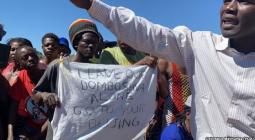Clive Palmer ordered to pay $13m after claim of being ‘foreign investor’ in Australian mining project thrown out
Attorney general says mining magnate is ‘not a foreign investor’ and is ‘not entitled to any benefits under Australia’s free trade and investment agreements’
The Australian mining magnate Clive Palmer has been ordered to pay more than $13m after his claim of being a “foreign investor” was dismissed by an international tribunal after a dispute lasting more than a decade.
The permanent court of arbitration, established by international treaties, rejected Palmer’s claim as it had no jurisdiction over the dispute between a national government and one of its citizens, the attorney general, Michelle Rowland, said on Saturday.
“Mr Palmer is not a ‘foreign investor’ and is not entitled to any benefits under Australia’s free trade and investment agreements,” she said.
“Australia should never have had to spend two years and over $13m defending an investor-state claim brought by an Australian national.”
A Singaporean investment company owned by Palmer claimed damages totalling almost $US200bn ($A305bn) after a mining proposal in Western Australia’s Pilbara region was blocked.
The case against the commonwealth argued breaches of the Asean-Australian-New Zealand free trade agreement.
The WA government came under scrutiny for legislation preventing damages being sought in relation to the dispute in 2020, stemming from an initial rejection in 2012.
Palmer’s initial claim for almost $30bn would have bankrupted the state if successful, WA attorney general, Tony Buti, said in a statement on Saturday.
“I trust this decision will finally close the book on this long-running saga,” he said.
Palmer claimed the legislation was “akin to the actions of a banana republic” in a notice of arbitration to the international tribunal after the high court rejected the challenge.
The arbitration court operated under a “very unusual system” that allowed foreign investors to sue the state they invested in, outside that state’s courts, international-state dispute settlement expert Jonathan Bonnitcha said.
“It’s a way to basically internationalise a dispute,” the UNSW law associate professor said.
The ad-hoc tribunals are comprised of two arbitrators nominated by the claimant and respondent, who then agree on a third.
The government has a policy to exclude the process from future trade agreements, in line with some others internationally.
Palmer’s other cases might also end if subsequent tribunals adopt the most recent position but precedents are not binding under the system.
In addition to being one of Australia’s wealthiest citizens, Palmer is also a prominent figure in politics who has chaired several parties and represented the Queensland seat of Fairfax in federal parliament.
His campaign for the 2025 election, which ran under the Trumpet of Patriots banner, included a call for Australians to “wake up”.
None of the party’s candidates were elected.
The tribunal’s decision, yet to be made public, ordered Palmer to pay costs of $13.6m, Rowland said.
Palmer will review the judgment, a spokesperson said.
The dispute was subject to a three-day hearing in The Hague on jurisdiction and admissibility in September 2024.
Australian Fair Trade and Investment Network convener, Patricia Ranald, said Palmer’s claim had exposed “the absurdity” of international-state dispute settlement.
“[It] lacks proper legal safeguards and allows investors to game the system and make outrageous claims,” she said.
“This is a narrow escape and there could be more claims from other fossil fuel or other foreign investors.”
Cover photo: Clive Palmer had claimed the process of blocking a 2012 mining project in WA was akin to a ‘banana republic’ and sought damages. Photograph: Bianca de Marchi/AAP



